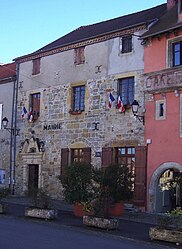Capdenac
Capdenac | |
|---|---|
 The town hall in Capdenac | |
| Coordinates: 44°34′54″N 2°04′12″E / 44.5817°N 2.07°E | |
| Country | France |
| Region | Occitania |
| Department | Lot |
| Arrondissement | Figeac |
| Canton | Figeac-2 |
| Intercommunality | Grand-Figeac |
| Government | |
| • Mayor (2020–2026) | Guy Batherosse[1] |
| Area 1 | 10.90 km2 (4.21 sq mi) |
| Population (2021)[2] | 1,091 |
| • Density | 100/km2 (260/sq mi) |
| Time zone | UTC+01:00 (CET) |
| • Summer (DST) | UTC+02:00 (CEST) |
| INSEE/Postal code | 46055 /46100 |
| Elevation | 155–369 m (509–1,211 ft) (avg. 298 m or 978 ft) |
| 1 French Land Register data, which excludes lakes, ponds, glaciers > 1 km2 (0.386 sq mi or 247 acres) and river estuaries. | |
Capdenac (French pronunciation: [kapdənak]) is a commune in the Lot department in south-western France. It is a member of Les Plus Beaux Villages de France (The Most Beautiful Villages of France) Association.
It has been inhabited since prehistoric times. At one time Capdenac was thought to be identifiable as the Gaulish settlement of Uxellodunum which was besieged by Julius Caesar,[3] but this theory has been discredited.[4]
Geography
[edit]The old village of Capdenac is situated on a hill on a ridge which forces a large meander in the river Lot. It is directly west, across the river from the main town of Capdenac-Gare. To the south of Capdenac-Gare is the area of Massip, which is the location of a convent.
Convent during the Second World War
[edit]During the Second World War, encouraged by contact with Archbishop Saliège and Monseigneur de Courrège d'Ustou,[5] Sister Denise Bergon arranged for the convent of Notre Dame de Massip in Capdenac (where she was Mother Superior) to shelter some 83 Jewish children at risk due to the Holocaust in France.[6][7] The children were hidden in the convent's boarding school. Apart from Sister Denise, only Sister Marguerite Roques (nurse and mathematics teacher), together with the school's chaplain and two other sisters knew the truth about the children's religious backgrounds.[6] Another source lists the following in the rescue network: Denise Bergon (Soeur Denise), Jeannette Bettelheim (called Don Quich Jeanne Sicard), Louis de Courrèges d'Ustou (Monseigneur de Courrèges), Georges Garel, Marguerite Roques, and Jules Saliège (Monseigneur Saliège).[8]
See also
[edit]References
[edit]- ^ "Répertoire national des élus: les maires". data.gouv.fr, Plateforme ouverte des données publiques françaises (in French). 2 December 2020.
- ^ "Populations légales 2021" (in French). The National Institute of Statistics and Economic Studies. 28 December 2023.
- ^ baron de Walckenaer, Géographie ancienne historique et comparée des Gaules cisalpine et transalpine, p 353, Paris, 1862 (1st edition 1839)
- ^ (2008-08-06), Uxellodunum: une nouvelle bataille en perspective, La Dépêche du Midi (ladepeche.fr) tr. Uxellodunum: A new battle in perspective (in French)
- ^ Notre-Dame-de-Massip durant la Seconde Guerre mondiale (WWII) www.ajpn.org (Anonymes, Justes et Persécutés durant la période Nazie dans les communes de France), accessed 15 September 2020
- ^ a b Hughes, Niamh (5 September 2020). "The daring nun who hid and saved 83 Jewish children". BBC News. Retrieved 6 September 2020.
- ^ Clergy Who Rescued or Aided Jews in France www.holocaustrescue.org, accessed 6 September 2020
- ^ Louise Thèbes www.ajpn.org (Anonymes, Justes et Persécutés durant la période Nazie dans les communes de France), accessed 15 September 2020




